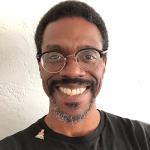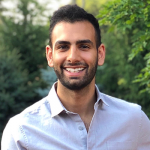
Abolition, Incarceration, and the Public’s Health
Recently, the issue of prison reform has been gaining national attention, forcing policymakers to rethink the issue. As momentum grows to call for change, how does public health play a role in ending mass incarceration and reforming a criminal justice system?


Register
Course Information
- Audience: Public Health Professionals
- Format: Recorded Webinar
- Date/Time: Wednesday, September 28, 2022, 1:00 PM – 2:30 PM ET
- Price: Free
- Length: 1.5 hours
- Credential(s) eligible for contact hours: Sponsored by New England Public Health Training Center (NEPHTC), a designated provider of continuing education contact hours (CECH) in health education by the National Commission for Health Education Credentialing, Inc. This program is designated for Certified Health Education Specialists (CHES) and/or Master Certified Health Education Specialists (MCHES) to receive up to 1.5 total Category I continuing education contact hours. Maximum advanced-level continuing education contact hours are 0. Provider ID: 1131137 Event ID: SS1131137_09282022If you are not seeking a CHES/MCHES contact hours, if you complete the post-test and evaluation, you will receive a Certificate of Completion. The Certificate will include the length of the course.
- Competencies: Policy Development and Program Planning Skills
- Learning Level: Awareness
- Companion Trainings: None
- Supplemental materials:None
- Pre-requisites: None
About this Recording
The United States is the most incarcerated nation in the world. Decades of harmful policies have led to overcrowded prisons and a broken criminal justice system, leading to prison populations that are disproportionately poor and people of color. Recently, the issue of prison reform has been gaining national attention, forcing policymakers to rethink the issue. As momentum grows to call for change, how does public health play a role in ending mass incarceration and reforming a criminal justice system?
What you'll learn
At the end of the recording, participants will be able to:
- Explain how housing can be a point of intervention to reduce the risk of incarceration
- Describe the abolitionist approach to end cycles of incarceration
- Compare community violence intervention and alternative community first responder programs to the criminal justice system approach currently in place in the United States
- Give examples of courses that can train public health students to understand and develop strategies to address mass criminalization and mass incarceration
- Discuss how an integrated advocacy approach, using public health research, can support abolishment of major systems of oppression
Moderator

Deborah Douglas
@DEBOFFICIALLYCo-Editor in Chief, The Emancipator

Angela Aidala
@COLUMBIAMSPH
Associate Research Scientist, Columbia Mailman School of Public Health
Dana Rice
@DKRICEDRPH
Assistant Professor, University of North Carolina Gillings School of Global Public Health
Insha Rahman
@VERAINSTITUTE
Vice President of Vera Action, Vice President of Advocacy and Partnerships
Emile DeWeaver
@PRSNRENAISSANCE
Author; Co-founder,
Prison Renaissance
Zal Shroff
@LCCRSF
Senior Attorney, Racial Justice, Lawyers' Committee for Civil Rights
DEBORAH D. DOUGLAS is co-editor in chief of The Emancipator. She previously served as the Eugene S. Pulliam Distinguished Visiting Professor at DePauw University, senior leader with The OpEd Project, amplifying underrepresented expert voices, and founding managing editor of MLK50: Justice Through Journalism. While teaching at Northwestern University, she spearheaded a graduate investigative journalism capstone on the Civil Rights Act of 1964 and taught best practices in Karachi, Pakistan. Douglas’ adventures in thought leadership were seeded at the Chicago Sun-Times where she served as Deputy Editorial Page Editor/Columnist. Deborah is author of the “U.S. Civil Rights Trail: A Traveler’s Guide to the People, Places, and Events That Made the Movement” (Moon, 2021), the first-ever travel guide to follow the official civil rights trail in the South, and a contributor to “Four Hundred Souls: A Community History of African America, 1619-2019” (OneWorld, 2021). Among her many recognitions, she received Chicago’s prestigious Studs Terkel Award and the Society of American Travel Writers 2021 Guidebook of the Year.
Subject Matter Experts
Angela A. Aidala, Ph.D., is a Research Scientist at the Columbia University Mailman School of Public Health in the Department of Sociomedical Sciences. Her major interest is research, teaching, and service delivery strategies to work effectively with harder to reach or ‘hidden’ populations in urban settings crucial to understanding health disparities: disadvantaged and socially marginalized youth and adults challenged by unstable housing/ homeless experience, mental illness, substance use, and/or criminal justice involvement. She is committed to applied research — working with community members, policy makers, service providers, and advocates to translate research to inform policy and program decision making. Dr. Aidala currently leads a 10 year follow-up of a demonstration project that brought together multiple governmental agencies (Corrections, Homeless Services, Health), housing providers, and community stakeholders for a housing-based intervention for adults with complex needs and histories of cycling in and out of incarceration, homelessness, and crisis health care institutions – the Frequent Users Services Engagement (FUSE) initiative. Documented success of the original project has inspired multiple jurisdictions throughout the US to launch similar efforts. The FUSE long term follow-up study analyzes the role of stable housing as a critical component of successful community reentry, not just in the short term but considering impacts over the life course. We examine longitudinal trajectories among multiple life domains –incarceration, housing, and health – analyzing interdependencies and policy and institutional contexts.
Dana Rice, DrPH, assistant professor, is a public health practitioner and researcher who examines best practices in public health leadership and community engagement with a health equity, social justice and human rights lens. Her primary focus is on the integration of public health and correctional health systems and the impact of mass criminalization and mass incarceration on public health. She was a recipient of the student-nominated Award for Excellence in Teaching and Innovation, the peer-nominated Delta Omega Faculty Award and a UNC Equity in Teaching fellow. Prior to joining the faculty at Gillings, Dr. Rice spent 20 years working in the public, private and non-profit sectors. Her most recent work was dedicated to designing, implementing and evaluating an HIV/STD screening program in a large urban jail and training graduate public health and medical students in translating applied public health practice skills to a variety of community settings.
Insha Rahman is Vice President for Advocacy and Partnerships at the Vera Institute of Justice and Vice President of Vera Action, Vera’s 501c4 sister organization. She leads the development of Vera and Vera Action’s advocacy priorities and campaigns across the organization, partnering with government, advocates, and organizers to win policy change to end mass incarceration and build safe, thriving communities for all. Insha is a nationally recognized expert on bail reform and pretrial justice. In addition to overseeing Vera and Vera Action’s advocacy priorities, she supervises the organization’s place-based initiatives in California, Louisiana, and New York. She has been quoted as an expert in several outlets, including The New York Times, NPR, and PBS. Prior to joining Vera, she was a public defender at The Bronx Defenders. She graduated with a BA in Africana Studies from Vassar College and earned her J.D. from the City University of New York School of Law.
Emile is an African-American activist whose life sentence in prison was commuted by California’s Governor Brown after 21 years for his community work in prison. While in prison, he was a culture writer for Easy Street Magazine; he co-founded Prison Renaissance, and despite the criminalization of organizing in California prisons, he covertly organized in prison to pass legislation that changed the way California treats juveniles in its criminal legal system. Currently Emile holds workshops on abolitionist strategies to develop policy and programs, and he’s working on his memoir for The New Press titled Ghost in the Prison Industrial Machine.
Zal is a Senior Staff Attorney on the Racial Justice team. Prior to joining LCCRSF, Zal was a Clinical Lecturer-in-Law at Yale Law School where he worked with students to improve ballot access for incarcerated individuals and supervised litigation against the federal Bureau of Prisons for its response to the pandemic. Before that, Zal was a Staff Attorney at the ACLU of Kansas where he worked on a variety of civil rights cases spanning conditions of confinement, prosecutorial/police accountability, voting rights, race and religious discrimination, and First Amendment issues. Immediately after law school, Zal was the Clifford Chance Foundation Fellow at the Vera Institute of Justice, where he worked on non-profit in-house regulatory and compliance matters, and spearheaded a project on accessing state financial aid dollars for college in prison programs nationwide. Zal is a graduate of Brown University and received his JD from Columbia Law School. He is admitted to practice in New York, Connecticut, and Kansas, and is an MJP Registered Legal Aid Attorney in the State of California.
Registration
Select the Enroll Me button below to register for this recording. If you have any trouble accessing the recording, contact support@nephtc.org.
Acknowledgement: This project is supported by the Health Resources and Services Administration (HRSA) of the U.S. Department of Health and Human Services (HHS) as part of award 2 UB6HP31685‐05‐00 “Public Health Training Centers.” The contents are those of the author(s) and do not necessarily represent the official views of, nor an endorsement, by HRSA, HHS or the U.S. Government.

